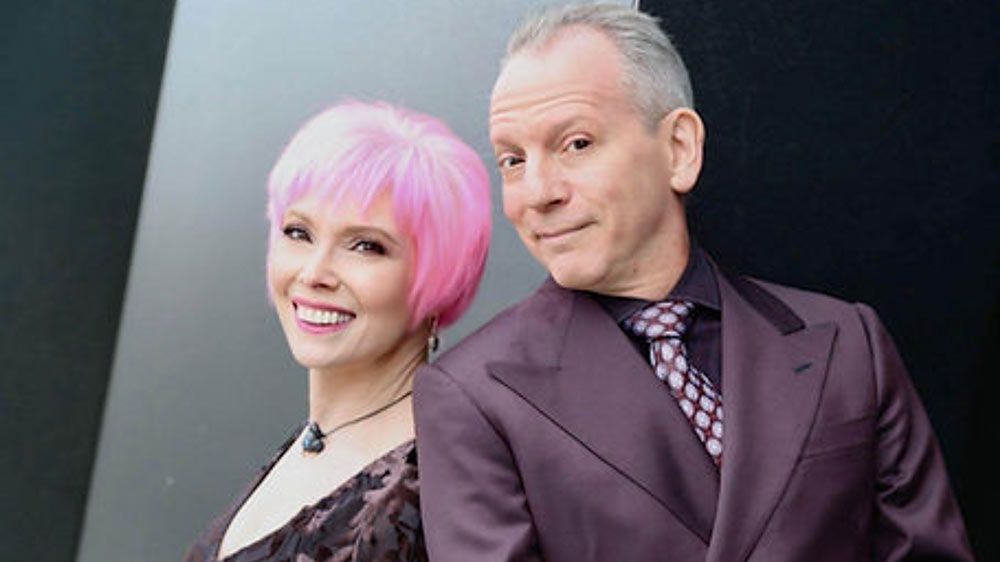
Feb 12
She Loved 'Sweeney Todd.' How Singer Mardie Millit Befriended Stephen Sondheim (And Has a Show About It)
John Amodeo READ TIME: 11 MIN.
"There is some fear of other people looking at me and saying, 'Who do you think you are, declaring a kinship with this genius?'" confesses MAC Award-winning cabaret singer Mardie Millit about her cabaret show "Sorry-Grateful: One Sondheim Story in Letters and Song" that gradually unveils her unique relationship with Stephen Sondheim. "But finally, I had to say, 'I don't care. I do have this connection, I did feel it, and I did benefit from it.'" In this show, Millit shares how she, as an awkward young teenager, wrote a fan letter to Stephen Sondheim, launching a lifelong correspondence that evolved into a rare friendship.
Millit is one half of the Manhattan-based cabaret duo Michael Garin and Mardie Millit, who have been performing together since they met in 2005 at Jim Caruso's Cast Party at Birdland. Millit, with Garin at the piano, premiered "Sorry-Grateful" at last June's CabaretFest Provincetown to cheers and ovations.
It was so well received there that this past November they gave the show its New York debut at Don't Tell Mama. Theater Pizzazz's Andrew Poretz called it "a well-crafted and very personal show that is sure to make a repeat appearance. See it." Renowned multi-MAC Award-winning cabaret singer Jeff Harnar gushed, "The story is pricelessly her own; the songs are freshly illuminated within the context of these captivating letters; the arrangements are winningly inventive in Michael's hands; the direction by Eric Michael Gillett is brilliant. And at the heart of it all are Mardie's breathtaking renditions of these songs that have an uncanny personal resonance." Millit, with Garin at the piano, will perform "Sorry-Grateful: One Sondheim Story in Letters and Song" again in New York, this time at the Laurie Beechman Theatre on February 13, and will return to Massachusetts with the show, this time at Josephine's Cabaret in Club Café's Napoleon Room on February 18.
Watch Mardie Millit and Michael Garin perform Stephen Sondheim's "Sorry/Grateful"
Garin, Drama Desk Award-winning composer/lyricist of the Off-Broadway musical "Song of Singapore," comes from the comedy side of music, while Millit, who is trained in classical music and opera, had been approaching musical theater and singing through that lens. However unlikely their pairing may seem on the surface, their polar-opposite backgrounds blend to create a unique sound with a zany and funky theatricality that earned them a Broadway World Cabaret Award in 2021 and a "Best Cabaret Duo" MAC Award in 2022.
As a duo, they've been described as "a modern Louis Prima and Keely Smith," but with goofy humor that toggles between teasing and self-deprecating, their rapport on stage brings to mind Sonny and Cher and the vaudeville-style routines of the Smothers Brothers. In 2012, the couple married, adding more spark and edge to their act.
Unlike all of their prior shows, "Sorry-Grateful: One Sondheim Story in Letters and Song" is Millit's story, very personal and, at times, disarming in its expression of awe and vulnerability. It is therefore billed not as "Michael and Mardie," but as "Mardie Millit, with Michael Garin," though Garin's role as musical arranger and accompanist is nevertheless integral in helping shape the show.
EDGE spoke with this fun couple about the show, the influence of vaudeville, and how infusing Sondheim with a little funk still works.

EDGE: This upcoming show is more Mardie's show, so most of the interview will focus on Mardie, but Michael, I will eventually have some questions for you. I don't want you to feel ignored.
Mardie Millit: I want him to feel ignored. [Laughs]
Michael Garin: I adore being ignored.
EDGE: Mardie, in your show you mention you were a nerdy kid. What made you nerdy as a child?
Mardie Millit: There are a lot of factors that make a nerdy kid. The first being, I always loved reading. My dad was an egghead with a huge library of books at home. I was taught to think of books as a treat.
Fate made me a fat, bucktoothed kid in Shadyside, a small town in eastern Ohio, and I was made fun of because I was one of those kids who didn't look average.
And when I was four or five, I asked my parents to play one of their albums that had a cartoon on the cover: it was Hirschfield's drawing for "My Fair Lady." And when they put it on, I went tearing around the living room, dancing to this wonderful music. My parents collected Broadway original cast albums because popular music at that time was coming from Broadway musicals, and that environment alone could make you geeky.
As I got older and made friends, most of them were guys a little older than I, and interested in musical theater. It took me until the end of high school to know they were all gay. Guys didn't talk about that to their straight female friends then; we either got it, or we didn't. We always thought, "He's just flamboyant."
EDGE: You were inspired to write your first letter to Stephen Sondheim after seeing the Broadway production of "Sweeney Todd." What about the show compelled you to write to Sondheim?
Mardie Millit: I was 14 and had been studying classical music for four to five years at that time. I was listening to a lot of opera and classical music, and to hear a Broadway show that used so many elements of classical music, so much harmonic language, so many forms of classical music, just made my head explode.
People used to complain that his music was atonal, but he wasn't afraid to use dissonance in a dramatic way. There was always a reason for it. He used it theatrically. Every choice was related to something dramatic that was happening in the scene, or the character's intelligence and emotions. I couldn't have articulated it quite that way back then, but I felt a new world had opened up to me, to understand that musical theater could be so much more complex and so much more fulfilling than the stuff I already knew and loved like "South Pacific" and "Fiddler [on the Roof]." The fact that Sondheim was taking that canon of musical theater and breaking it open to levels of sophistication opened it up to all of those other musical possibilities of plot, character, and emotion.
So, when I wrote to him and he wrote back, miraculously, I had reached out to someone who created this thing, and he became my friend, which is pretty amazing. He liked interacting with people who appreciated his work; he liked that I was a kid from far away that still got what he was writing. He grew up in Manhattan and couldn't imagine how starved for culture a child in Shadyside, Ohio would be, and how important his writing back was to me. He treated me with so much respect and kindness. And for someone of my age, he never talked down to me, yet he gave me a lot of grace for my youth, in a way that Oscar Hammerstein must have done for him. I was one of many recipients of that kindness, and it changed my life.
John Amodeo is a free lance writer living in the Boston streetcar suburb of Dorchester with his husband of 23 years. He has covered cabaret for Bay Windows and Theatermania.com, and is the Boston correspondent for Cabaret Scenes Magazine.







